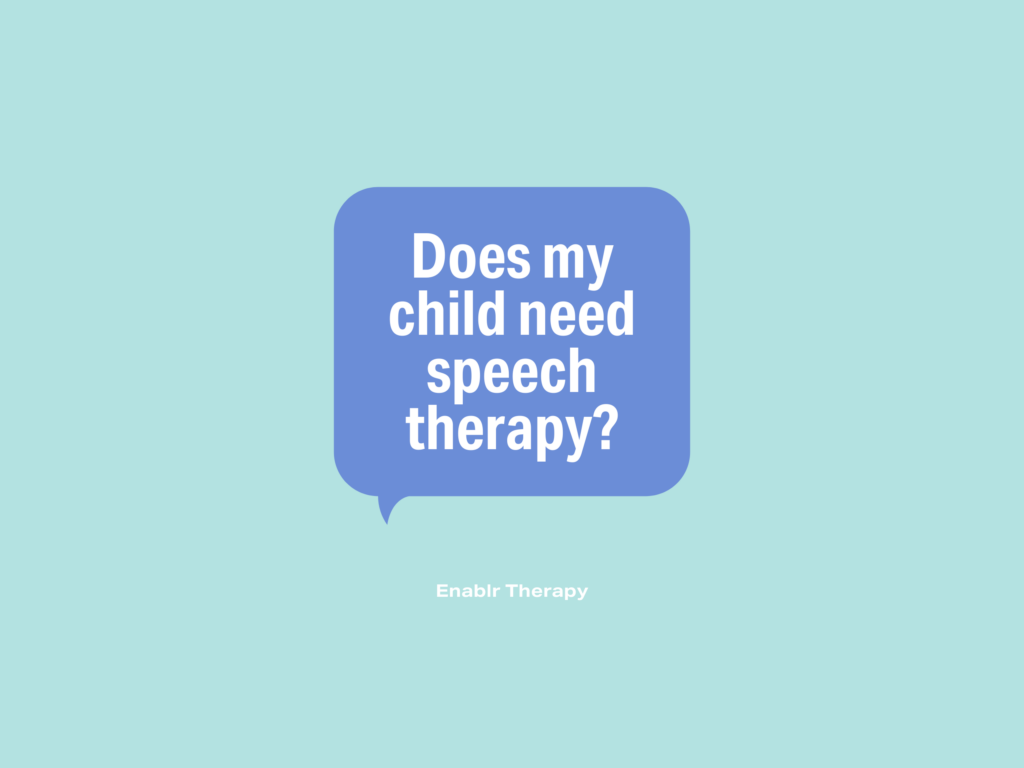At one point or another, almost every parent will wonder if their child’s speech development is on track with their age group. Rest assured, you are not alone. The good news is there are now more options than ever to make sure your child gets the support they need – where they need it – for continued development. Enablr’s expert and experienced therapists can help!
Milestone skills develop rapidly over the first few years of life and extend into early adulthood. Starting with crying and babbling, an infant learns how to express themselves and interact with those around them. As a toddler, a child learns to express their wants, needs, and share their interests verbally and through gestures. As the child gets older, vocabulary expands to allow for an understanding of more complex and abstract concepts about the world around them.
Typically, children develop language milestones around the same ages. Monitoring milestones can give insight into your child’s skill level and may help to identify any potential concerns. However, please note, each child is unique and may progress at a different rate or even skip a milestone all together.
Speech pathologists work with children on both speech and language skills. Speech refers to a child’s ability to appropriately form sounds or words typical of their age group. Language refers to how a child understands and uses language to relate to others and the world around them.
Please see our two “tools” below to see where your child currently stands.
Language Milestones:
0-3 Months
- Smiles at people
- Responses to sounds
- Makes cooing and babbling sounds
3-6 Months
- Makes gurgling sounds when playing with you or left alone
- Babbles, increasing the variety of sounds
- Uses his or her voice to express pleasure and displeasure
6-9 Months
- Smiles when you appear
- Makes speech like babbling sounds that include puh, ba, mi, da, and stringing vowel sounds together
- Cries different ways to show hunger, pain, or tiredness
- Responds to name
- Take turns with parents while “talking” and making sounds
9-12 Months
- Understands “no”
- Copies sounds and gestures of others
- Points at things with finger
- Makes different sounds sounds that are closer to words like “Mamama”, “upup”, and “bababa”
12-18 Months
- Uses simple gestures to communicate like waving “bye” or shaking head “no”
- Responses to simple requests like “give me”
- Changes tone when talking. Use exclamations like “uh-oh!”
- Starts to use a few single words like “mama”, “dada”, and “uh-oh!” and tries to imitate words
18-24 Months
- Says several single words and starts to put two words together into a phrase
- Knows what common objects are used for (ex- talking on phone or using brush on hair)
- Points to show what he/she wants or to show interest in something
- Plays simple pretend games like feeding a baby
- Uses words or phrases to question
2-3 Years
- Says at least 50 words, adds new words regularly
- Uses two to four words to talk about and ask for things.
- Speech is understood by familiar listeners most of the time.
- Follows simple 2 step directions like “pick up the toy and put it in the box”
- Plays and talks with other children
3 Years
- Speech is understood by people familiar with the child as well as some
- Uses sentences with five to six words and carries on a conversation with 2-3 sentences
- Says m, n, h, w, p, b, t, d, k, g, and f in words correctly
- Plays and talks with other children
4 Years
- Knows basic rules of grammar. Uses “he” and “she” correctly
- Tells stories, sings songs, and asks questions
- Shows concern for friends and takes turns when playing a games
- Understood by strangers most of the time when speaking
5 Years
- Uses future tense (“Mom will be back soon”)
- Tells what he/she thinks will happen next in a book
- Prefers to play with other kids and is imaginative in play
- Knows name and address
Speech Development Milestones:
By 3 Years Old:
- P as in pot
- D as in dog
- M as in mom
- K as in kid
- W as in whale
- G as in go
- H as in house
- T as in Toy
- B as in boat
- N as in no
- F as in fish
- Y as in yoyo
By 4 Years Old:
- J as in jelly
- L as in light
- CH as in chicken
- SH as in ship
- S as in sun
- V as in vest
- Z as in zoo
By 5 Years Old:
- R as in rain
- TH-Voiced (using vocal cords) as in that
- ZH as in measure or treasure
By 6 Years Old:
- TH-Unvoiced (not using vocal cords) as in think
It is important to note that this information depicts a general range of development, and should only be used as a guide. If you have any concerns regarding your child’s speech development, we recommend that you contact a pediatrician or speech-language pathologist.
References:
American Academy of Pediatrics (n.d.) Ages and Stages. Retrieved from https://healthychildren.org/english/ages-stages/pages/default.aspx
American Speech-Language-Hearing Association. Speech Sound Disorders. Retrieved from https://www.asha.org/public/speech/disorders/Speech-Sound-Disorders/
American Speech-Language-Hearing Association. Early Identification of Speech, Language, and Hearing Disorders. Retrieved from https://www.asha.org/public/early-identification-of-speech-language-and-hearing-disorders/
Center for Disease Control (n.d.). Milestone Checklist. Retrieved from https://www.cdc.gov/ncbddd/actearly/pdf/checklists/Checklists-with-Tips_Reader_508.pdf


